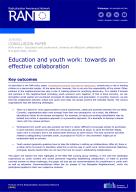Details
- Publication date
- 7 June 2021
- Author
- Directorate-General for Migration and Home Affairs
- RAN Publications Topic
- Formal/informal education
Description
As described in the RAN policy paper Transforming schools into labs for democracy, schools play a role in binding children to a democratic society. At the same time, however, this is not only the responsibility of the school. Other partners in the neighbourhood also play a role in creating places for practicing democracy.
It is helpful if schools and partners in the neighbourhood (including youth workers) work together. If this is done correctly, we can strengthen social capital and counteract processes of radicalisation and polarisation. In practice, however, we see that this collaboration between school and youth work does not always achieve the intended results.
The various organisations face the following challenges:
- There is a desire for more opportunities to share experiences, needs and expertise between the two fields. Currently, organisations often work strongly from their own perspective. As a result, the different educational visions do not always correspond. For example, an issue surrounding radicalisation may be tackled from either a repressive approach or a preventive approach. It is desirable to develop a shared vision with the various partners.
- Participants from youth work also pointed out that it is rather difficult to encourage schools to participate in joint activities, because the parties are not always perceived as equal. In some EU Member States, youth work is voluntary and is not always taken seriously by other actors. This also counts for activities related to safeguarding vulnerable youth, as projects on P/CVE or ‘risk prevention’ might put an undesirable label on schools.
- Youth workers generally speaking have to take the initiative in setting up collaborations. After all, there is a rather strict curriculum in education while this is not the case in youth work. School personnel (teachers, principals, faculty heads) often do not have the time to invest in establishing collaborations.
This paper will explore the main highlights of the RAN Y&E working group meeting, in line with the challenges experienced by youth workers and school personnel regarding establishing collaboration. In order to provide concrete answers to these challenges, this paper will also set out recommendations for practitioners in youth work as well as education. Recommendations follow the six phases of ‘the Peaceable Neighbourhood’, which the participants applied to their own respective contexts.

